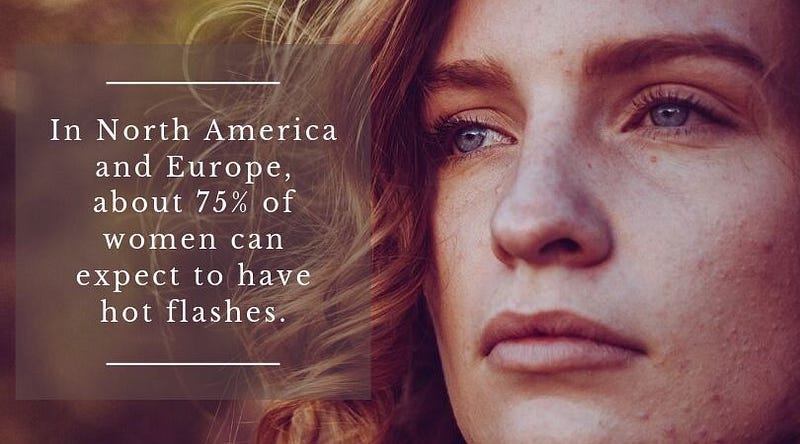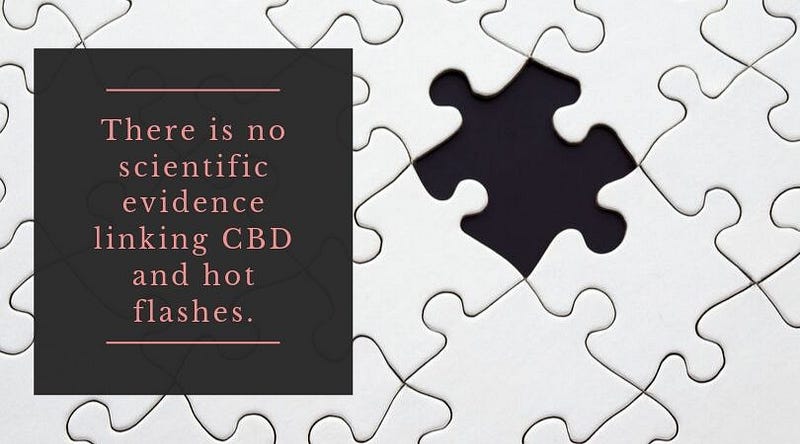Exploring CBD's Impact on Hot Flashes During Menopause
Written on
Understanding Hot Flashes: An Introduction
Recently, I reached out to my readers of a growing health publication, expressing gratitude for their support and encouraging them to share any cannabis-related inquiries. One particular message stood out:
Dear Dr. Lowry,
I’m curious about CBD and its effects on hot flashes experienced by menopausal women. After using CBD oil for back pain, my previously absent hot flashes have returned. I've searched online for information but mostly find ads promoting CBD for menopause. Can you provide more insight?
Initially, I had little knowledge about the connection between CBD and hot flashes, but the query sparked my curiosity. Given that THC influences female hormones, it’s conceivable that CBD might also have an impact. This provided an opportunity for me to assist a reader while gaining knowledge on the topic.
What Exactly Is a Hot Flash?
As a non-menopausal individual, my understanding of hot flashes was shaped largely by media portrayals and conversations with my mother. The first step in addressing this reader's concern was to clarify what a hot flash entails.
A hot flash (or flush, in some regions) begins with an overwhelming sensation of heat, followed by sweating and reddening of the skin on the chest, torso, and face. These episodes usually last a few minutes but can extend up to an hour. Hot flashes can occur at any time, even during sleep, and may be triggered by various factors such as embarrassment, temperature changes, stress, alcohol, caffeine, or even for no apparent reason.

While not all women experience hot flashes during menopause, studies indicate that approximately 75% of women in North America and Europe will. Once they begin, hot flashes typically persist for around 3.5 to 5 years before gradually decreasing in frequency. These episodes are associated with the decline in estrogen levels during menopause. Treatment options include hormone replacement therapy, clonidine, cognitive behavioral therapy, and increasingly, SSRIs like Prozac.
The Mechanism Behind Hot Flashes
Two menopausal changes contribute to the onset of hot flashes. Firstly, there’s a shift in what constitutes “too hot” or “too cold.” Humans have an internal thermostat that maintains a core body temperature near 98.6°F (37°C). When the body overheats, sweating occurs to cool down; conversely, shivering happens when it gets too cold. During menopause, the threshold for feeling hot drops significantly, leading to heightened heat sensitivity.
While this change alone could be manageable, the second issue is that the body’s ability to gauge its temperature becomes impaired. Picture a thermostat that occasionally misreads the temperature, causing the body to react as if it’s overheating, even when it isn’t. The result? A hot flash, which helps cool the body by directing blood to the skin's surface to dissipate heat. This explains the reddened skin and heated sensation during an episode.
Exploring the Connection Between CBD and Hot Flashes
So, how does CBD fit into this picture? Unfortunately, there are currently no conclusive answers. Most cannabis research focuses on THC, addressing issues like addiction and basic physiology. With the recent rise in CBD's popularity, research is slowly evolving, but it will take time before we can fully understand its health benefits.

Moreover, hot flashes themselves have not been extensively studied, likely due to funding challenges. As one review noted, since no one has died from a hot flash, this prominent menopausal symptom hasn’t garnered the research focus it deserves. To date, no studies seem to have examined the relationship between CBD and hot flashes. I reached out to several researchers for insights, but they were unaware of any relevant studies. Consequently, any claims suggesting CBD is beneficial for hot flashes lack scientific backing and warrant skepticism.
Speculating on Possible Effects of CBD
Given the lack of definitive answers, I can only offer educated speculation on how CBD might influence hot flashes:
- Hormonal Disruption: CBD interacts with cannabinoid receptors CB1 and CB2, both present in the ovaries where estrogen is produced. Changes in these receptors could disrupt normal estrogen signaling, potentially leading to hot flashes.
- Contamination Issues: A 2017 JAMA report indicated that around 70% of CBD extracts are mislabeled, often containing unexpected levels of THC or other cannabinoids that can affect hormone release.
- Serotonin Interaction: Serotonin plays a crucial role in various bodily functions, including temperature regulation. Some studies suggest CBD may activate serotonin receptors that influence temperature control, which could explain the potential for hot flashes.
- Coincidence: It's entirely plausible that the re-emergence of hot flashes is unrelated to CBD use.
While I wish I could provide more concrete answers, researching this topic has been both fascinating and rewarding. Thank you, dear reader, for entrusting me with your question.
About the Author

- Brandon Lowry holds a PhD from the Institute of Molecular Biology at the University of Oregon. A digital nomad and freelance writer, he covers topics related to cannabis, science, health, and travel. He also serves as the editor for Midnight Mosaic Fiction.
Chapter 2: Insights from Experts
In this video, Dr. Lauren Streicher discusses the implications of cannabis and its role in managing menopause symptoms, including hot flashes.
This informative video provides in-depth insights on cannabis and menopause, addressing common concerns and offering evidence-based information.